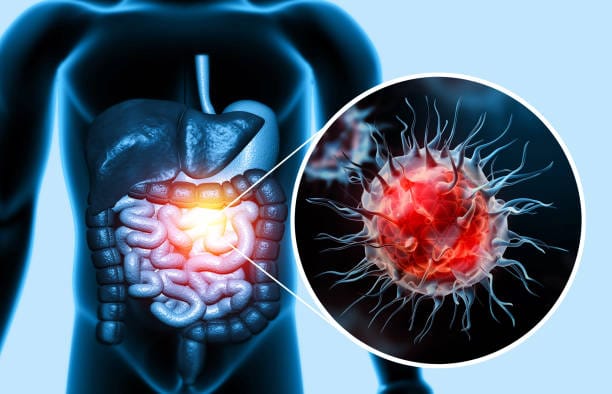Cancer rarely announces itself with a bang. It slips into the body quietly, sometimes with a whisper, often going unnoticed for months or even years. Among the many types of cancer that can affect human life, colon cancer—also known as colorectal cancer—is one of the most insidious. It doesn’t scream for attention at first. It doesn’t always come with a lump you can feel or a wound you can see. Instead, it hides behind symptoms that can easily be mistaken for less serious problems: bloating, fatigue, changes in bathroom habits. But make no mistake: colon cancer can be deadly. And the earlier it is caught, the better the chance of survival.
The colon, or large intestine, is not just a waste-processing tube. It plays a vital role in extracting water and nutrients from food, balancing gut flora, and maintaining digestive harmony. But when cells lining this crucial organ start to grow uncontrollably, what begins as a small polyp can evolve into a life-threatening malignancy.
Understanding the warning signs of colon cancer is not about feeding fear—it’s about empowering awareness. Because the truth is that colon cancer is one of the most preventable and treatable forms of cancer—if it’s caught early. And for that, knowledge is your strongest ally.
When the Body Whispers: Early Signs That Seem Innocent
The first signs of colon cancer are often so mild that many people dismiss them entirely. A slightly upset stomach. A new bout of constipation. A bit more gas than usual. These are things nearly everyone experiences at some point, so it’s understandable that many people chalk them up to stress, diet, or aging. But colon cancer doesn’t start with thunder—it starts with ripples. And those ripples, if ignored, can become waves.
One of the earliest clues might be a subtle change in bowel habits. Perhaps you notice you’re going less frequently. Or more frequently. Or that your stools are thinner, almost ribbon-like. You might feel like you haven’t completely emptied your bowels after using the bathroom. These are signs of potential obstruction or irritation within the colon—changes that could indicate a growing tumor. These symptoms don’t mean you have cancer, but they do mean something has changed, and that deserves attention.
Other times, the sign might come in the form of abdominal discomfort. It may feel like persistent cramps or a dull ache that doesn’t go away. You might feel bloated more often, even if your eating habits haven’t changed. These sensations can easily be mistaken for indigestion or irritable bowel syndrome (IBS), but if they persist or worsen, they warrant investigation.
When symptoms start, they do so quietly—but your body is trying to talk to you. Are you listening?
Blood Where It Shouldn’t Be
Perhaps the most alarming—but also most ignored—symptom of colon cancer is rectal bleeding. People often find blood in their stool and attribute it to hemorrhoids, especially if they are young or otherwise healthy. And sometimes it is. But rectal bleeding should never be shrugged off, especially if it is persistent or accompanied by other changes.
The blood may appear bright red, dark, or even black and tarry. This can depend on where in the colon the bleeding is happening. Tumors in the lower colon or rectum often produce bright red blood, while tumors in the upper colon may result in darker, digested blood. In some cases, bleeding may be so slight that it’s not visible to the naked eye, detectable only through lab testing—a hidden message buried in the body’s waste.
It’s important to remember that blood in the stool is not normal. Even if you’ve had hemorrhoids in the past, any new or ongoing bleeding deserves a doctor’s visit. Colon cancer does not discriminate—it’s no longer just an “older adult” disease.
The Weight That Slips Away
One of the most chilling aspects of cancer is its ability to rob the body silently. Colon cancer can interfere with nutrient absorption and cause inflammation, which may reduce appetite and alter how your body uses energy. As a result, unexplained weight loss is often a sign of something serious. Losing ten or more pounds without trying should never be ignored, especially if you’re also noticing fatigue or changes in bowel habits.
Unlike weight loss from exercise or dieting, this is a kind of vanishing that doesn’t make sense. Clothes become looser, the mirror reflects a thinner frame—but nothing in your lifestyle has changed. It is your body telling you it’s fighting a war inside.
In colon cancer, weight loss can happen due to metabolic changes, chronic blood loss leading to anemia, or a tumor physically blocking the colon and interfering with digestion. But regardless of the mechanism, rapid weight loss without explanation should always be treated as a red flag. It may not be cancer—but if it is, early detection is life-saving.
The Battle Below the Surface: Fatigue and Anemia
Imagine waking up tired, dragging yourself through the day, and feeling like you never truly catch your breath. This kind of persistent fatigue—one that rest doesn’t cure—is another subtle, yet critical warning sign. In many cases, fatigue results from iron-deficiency anemia, which occurs when slow, chronic blood loss from a colon tumor depletes your red blood cells over time.
Iron-deficiency anemia isn’t always obvious. It creeps in. You may start feeling dizzy or lightheaded, get cold easily, or experience shortness of breath even during mild exertion. Sometimes it’s dismissed as just getting older, or attributed to stress. But if blood loss is occurring in your gastrointestinal tract, the body has to work harder to carry oxygen to vital organs, leading to exhaustion and a sense that your body is no longer functioning as it once did.
Colon cancer-related anemia is often discovered during routine blood work. So if your doctor mentions low hemoglobin or iron levels without a clear reason, it’s time to dig deeper—perhaps literally.
Age Is Not a Shield: The Rise of Young-Onset Colon Cancer
There was a time when colon cancer was seen as an older person’s disease, and screening wasn’t even discussed until the age of 50. But that time is gone. Over the past two decades, colon cancer among younger adults—those in their 30s and 40s—has been rising at an alarming rate.
Doctors aren’t entirely sure why this is happening. Some point to dietary changes, sedentary lifestyles, obesity, or microbiome disruption as culprits. Others are investigating the role of environmental toxins and chronic inflammation. What is clear is that young people often ignore symptoms for too long. Because the idea of cancer seems so unlikely, they wait. They normalize their pain. They assume it will pass.
But colon cancer doesn’t care how old you are. It doesn’t care if you’re a marathon runner or a vegan or someone who just had a clean check-up. If you’re experiencing symptoms that persist—especially blood in the stool, abdominal pain, or unrelenting fatigue—then age is not a shield. Awareness must be your weapon.
Family History and Genetic Clues
Some people are born with a genetic time bomb ticking inside them. Hereditary syndromes like Lynch syndrome or familial adenomatous polyposis (FAP) dramatically increase the risk of colon cancer and often strike earlier in life. If you have a parent, sibling, or close relative who had colorectal cancer or large precancerous polyps, your own risk is significantly elevated.
These inherited mutations don’t guarantee you’ll develop cancer—but they make vigilance non-negotiable. Genetic counseling, earlier screening, and regular colonoscopies can literally save your life. And knowing your family history is as crucial as knowing your own medical record.
Unfortunately, many families don’t talk openly about cancer diagnoses. Shame, fear, or cultural barriers can cloud the picture. But silence is dangerous. Ask questions. Be the one who digs into the past so you can protect your future.
The Stigma That Kills
One of the cruelest things about colon cancer is that it attacks a part of the body people often feel embarrassed to talk about. Bowels are not polite conversation. Bleeding and constipation are seen as private matters. There’s a cultural reluctance—even among healthcare professionals—to speak openly about what happens in the bathroom.
But that silence is deadly.
We need to normalize conversations about colorectal health. We need to teach our children that paying attention to their poop is not weird—it’s wise. We need to strip away the shame so that people can seek help without fear or hesitation. Your colon is not a taboo. It’s part of your life. And it may try to save your life—if only you listen.
Screening: The Test That Could Save You
There is no other major cancer that is as preventable through screening as colon cancer. A colonoscopy not only detects cancer—it can remove pre-cancerous polyps before they turn dangerous. It’s a rare opportunity to stop cancer before it even starts.
And yet, millions of eligible adults delay or avoid screening. They’re afraid of the preparation. They’re uncomfortable with the idea. They don’t want to take time off work. But what is a few hours of inconvenience compared to the possibility of years of life gained?
Today, there are also less invasive options—stool DNA tests like Cologuard, fecal immunochemical tests (FIT), and CT colonography. While these are not as definitive as a colonoscopy, they are far better than doing nothing at all. For high-risk individuals, colonoscopy remains the gold standard. But any screening is better than silence.
Starting at age 45—or earlier for those with risk factors—you should begin discussing screening with your doctor. The sooner, the better. You don’t wait for your house to catch fire to install a smoke detector. You shouldn’t wait for symptoms to appear before screening for colon cancer.
The Hope Behind the Headlines
Here’s what you need to know: colon cancer is beatable. When caught early, it has a survival rate of over 90%. Even in more advanced stages, treatment is improving rapidly. Surgery, radiation, chemotherapy, and targeted biological therapies are all tools that doctors use to fight this disease—and win.
But the key is early detection. And that begins with you. It begins with noticing what your body is trying to tell you. It begins with listening to symptoms you might otherwise dismiss. It begins with shedding the fear and shame and stepping into awareness.
For many people, a diagnosis of colon cancer changes everything. But for some, a timely diagnosis saves everything—their future, their family, their life.
What You Can Do Right Now
If you take only one thing from this article, let it be this: do not ignore persistent changes in your body. Whether it’s your bathroom habits, your energy levels, your appetite, or your weight—if something feels wrong, get it checked.
Talk to your doctor. Ask for screening. Learn your family history. Encourage your loved ones to do the same. Colon cancer doesn’t have to be a death sentence. But ignorance can be.
This isn’t about fear. This is about power. The power of awareness. The power of prevention. The power of catching cancer before it catches you.
Your body is talking. Are you ready to listen?






